For a survey of the claims made by the Ecumenical Patriarchate, see “First without Equals”, On the Power of the Great Church: Address by Ecumenical Patriarch Bartholomew, 26 October 2018, and The Ecclesiology of the Ecumenical Patriarchate in 2018: Speech by Patriarch Bartholomew.
Does the Ecumenical Patriarchate have a particular authority contained in its role as “first among equals”?
Yes. Various inter-Church agreements have at our current time given the Ecumenical Patriarchate a special role in heading, ordering, and organizing various pan-Orthodox activities.
What is the scope of this authority?
This is the area of contention.
To some extent the past hundred years of pan-Orthodox cooperation have laid a groundwork that outlines a role for the Ecumenical Patriarch in the current pan-Orthodox global structures.1 What is happening though is that the Ecumenical Patriarchate is expanding its claims for jurisdiction beyond that which has been agreed upon. First of all, it claims universal jurisdiction over the diaspora. However, this interpretation of the canons is not something that has pan-Orthodox agreement. Also in the recent statements the Patriarchate has claimed it “enjoys canonical jurisdiction and all apostolic privileges in its responsibility for safeguarding the unity and communion of the local Churches but also for the overall journey of Orthodoxy in the contemporary world and history.” This also is up for debate. While all agree that the Patriarchate has an advisory and coordinating role as “first among equals”, no agreement has been reached concerning any canonical jurisdiction or apostolic privileges that accompany this role. These claims have been advanced unilaterally by the Ecumenical Patriarchate without agreement from the rest of the Church.
Who determines the scope of this authority?
Here lies the central issue, which if not solved will leave a continuing wound in the Church. Traditionally, the scope of authority of any bishop is received through the hands of other bishops. However, the Ecumenical Patriarchate is putting forward an ecclesiology wherein the authority he is claiming dwells and always has dwelt in the See of Constantinople, and thus he is not recognizing this responsibility and authority as a result of, and limited to, the agreements that have been signed.
As long as the Ecumenical Patriarchate continues to believe that this responsibility and authority exists in itself essentially, and thus is not something given by the rest of the Church, there can really be no agreement on what this authority consists of. Under this ecclesiology the Patriarchate of Constantinople has defended its position by simply claiming that anyone who disagrees with it is an enemy of and does not really love the Church. This is because it sees itself as essentially the Church. It is the vine and the other Churches are merely branches.
This attitude by the Patriarchate is a rejection of proper Orthodox ecclesiology wherein any bishop’s authority is something that is given by the existing ecclesiastical hierarchy, not something he has in himself. This attitude is causing turmoil for the Church. Unity cannot be maintained when one member is not submitted to the others but making its own rules.
The Bible calls us to submit to one another in the fear of God and also to submit to the governing authorities. The Ecumenical Patriarch is not submitted to either—both the Turkish government and the other autocephalous Churches see the actual jurisdictional authority of the Ecumenical Patriarch as being local, not universal.
Is the Ecumenical Patriarchate the “Mother Church” or the beginning of the Orthodox Church?
All the Churches have their beginning from the descent of the Holy Spirit at Pentecost, which happened in Jerusalem. This is the birthplace of the Church. However, we do not consider the Jerusalem Church a Mother Church in the sense that the EP is claiming. Various Churches become Mother Churches in a relative sense when they plant missions. This relative motherhood though only means that some Local Churches are involved in planting and guiding new Churches. It does not mean that any Local Church is a source of life for any other Church. The source of life for the whole Church is the one Mystery that we all partake of.
Can Orthodoxy exist without the Ecumenical Patriarchate?
The existence of the Church is not dependent upon any particular patriarch or administrative structure but is dependent upon the Holy Trinity as its source of existence, its ongoing life, and its right ordering, harmony, righteousness, and enlightenment. This life of the Holy Trinity is present as a sacramental reality interpenetrating the whole Church.
Is the Ecumenical Patariachate a unique or sole source of harmony, life, or light?
No. This life, harmony and light are present in as much as the Church is Christ’s Body and His energies interpenetrate the whole Church. An ecclesiology that remains faithful to Tradition understands that all the energies and operations of Christ exist in each part and the whole. An analogy would be how each cell in the human body contains the whole genome, or how every molecule of an iron bar placed in the fire takes on the attributes of the fire. It is this basic understanding that undergirds the affirmation that each Local Church represents an authentic manifestation in space and time of the fullness of the one, holy, catholic and apostolic Church.2 When we say “first among equals” the “among equals” is an affirmation of this fullness present in all.
When we recognize a hierarchy among these equals we are recognizing a hierarchy that is built, not on a difference in essence, but on a recognized and agreed upon order in the Church. This order has taken different forms over the course of history, but nevertheless always maintains some kind of hierarchical character.
This character of the Church images the Trinity, which is both hierarchical and yet equal in essence, but it is different from the Trinity in that the essence of the Trinity is the Father, and the essence of the Church is the God-man Jesus Christ. However, the character of the relations within the hierarchy of the Church are supposed to image the character of relations in the Trinity. Christ comments that He does not seek His own glory or will, and that He does not judge on His own.3 At the same time the Father is entrusting all judgment to the Son and glorifies the Son.4 There is a reciprocity in the Trinitarian hierarchy that is to be our ideal. Christ tells the Apostles that the one who wants to be great must become a servant, and the one who wants to be first among them must become a slave. This shows us that the hierarchical order in the Church is built upon mutual submission and obedience, not on an essentially indwelling power of one over the other.
This mutual effort is harmonized in as much as there is effort by all to submit to Christ, who is recognized by all as mystically dwelling in and guiding each and all. Church authority does not consist in submission to one person whose will and vision are asserted as supreme. The Orthodox hierarchy is a unity of action of equal persons in Christ, not a subordination of the many to one person who represents or takes the place of Christ.
Is the Ecumenical Patriarchate a unique or sole source of orthodoxy (i.e., right worship and doctrine)?
No. There have been many saintly and Orthodox patriarchs in Constantinople, as well as many heretical patriarchs of Constantinople. Orthodoxy in the Church is guaranteed because the Church is Christ’s Body and He is her head, ever present guiding and interpenetrating her in all her parts. The canon or right measure of Orthodoxy is found in the canonized saints, the canon of Scripture, and the canon of Orthodox councils and writings recognized by the Church. It does not dwell essentially in any particular Local Church or patriarch.
In his sermons celebrating the anniversary of his ascension to the papacy, St. Leo the Great Pope of Rome does not call attention to himself and his own power or holiness. Rather he emphasizes how the power invested in him as primate is shared by all the members. He tells his listeners not to look at his own lowliness and inadequacies, but to turn their gaze to St. Peter, and beyond him to Christ.5 This self-effacing attitude is at the heart of genuine holiness and right glory.
Is any bishop infallible or essentially Orthodox?
No. All members of the Church are Orthodox to the degree that they are united with and in perfect submission to Christ. It takes both the Sacraments and an individual’s free submission for someone to be Orthodox. The bishops are given a special grace for teaching and enlightening others, for governing the Church, and for guarding its unity and peace, but this does not exist as magically guaranteed apart from the individual’s free cooperation. It does not exist essentially in any bishop, but as sacramentally shared and participated in by all the bishops.
It is important to note that the heresy of an individual bishop does not make a schism. We see how Nestorius as Patriarch of Constantinople and Honorius Pope of Rome were both excommunicated, but this did not create a permanent schism—rather they were removed from office. St. Theophan the Recluse notes that over time individual passions become the custom and rule within a given society. It is when this happens within a particular Local Church that historically we see a substantial, lasting schism like the Great Schism instead of merely the excommunication and disciplining of a particular bishop. The Catholic Church is not in schism because a particular pope went wrong, but because the ecclesial culture—its values and way of approaching things—became something that was not Orthodox. We see a number of bishops who went against heretical tendencies in their own local Church. They ended up being persecuted and excommunicated, but finally they were vindicated and made saints. In many of these cases this sacrifice by the shepherd ended up saving the whole flock as they recognized his love and their own error and repented.
What is the ecclesiological place of the Russian Church? Is it the Third Rome, next in line after Constantinople?
No. Alexandria is next in line. It is a false claim that the Russian Church is out to usurp Constantinople’s position as the first Church. The Russian Church accepts the given order of the Churches in the dyptichs and as set-up in the current pan-Orthodox agreements. The ancient precedent that determines the order of primacy in the Church gives Alexandria third place after Constantinople, so ecclesiologically Alexandria would be the "Third Rome". This title when used of Russia is a political title that arose during a certain period in Russian history. If we want to use this terminology in an eccelsiological context we would say that Russia is "Fifth Rome". (Although technically this terminology is not usually used this way. I use it here to make a point.)
To sum up: The main problem is the claim of the Ecumenical Patriarchate that it is a source of order, life, orthodoxy…. whatever, for the rest of the Church. The claim seems to be that the Ecumenical Patriarch is somehow the essence and beginning of the Church in the way Adam is the beginning of the human race or the Father the source of the Trinity. This is placing a man in the place of God. The formative essence, life, and harmony of the Church dwell not in a man, but in the Sacraments. The Holy Spirit at Pentecost gave birth to the Church, the God-man Christ is Her essence, and deification in the Father Her end. For all things in the Church, Christ is the alpha and the omega, in Him all things have their beginning. He is ordering all things in accordance with His will, and in Him all things are being gathered together into one to be handed over to the Father.
Incorporated into this idea of itself is an idea of its position and authority that is well beyond the limits of what has been agreed to in the current pan-Orthodox administration. There can be no true unity nor healing for the Church as long as this patriarchate sees its authority as part of its essential existence, and does not admit that this is something that changes over time, given to it through mutual agreement of all the Churches.
We understand that Orthodox ecclesiology is both hierarchical and collegial. It is neither a monolithic structure like the Catholic Church, nor is it merely a gathering of equal but independent, individually acting parties. For a true Orthodox unity, we need a better, more Orthodox ecclesiology undergirding the pan-Orthodox administrative structures—one based in the understanding of how hierarchy is something that involves a reciprocal submission and obedience, and how collegiality is interdependent.

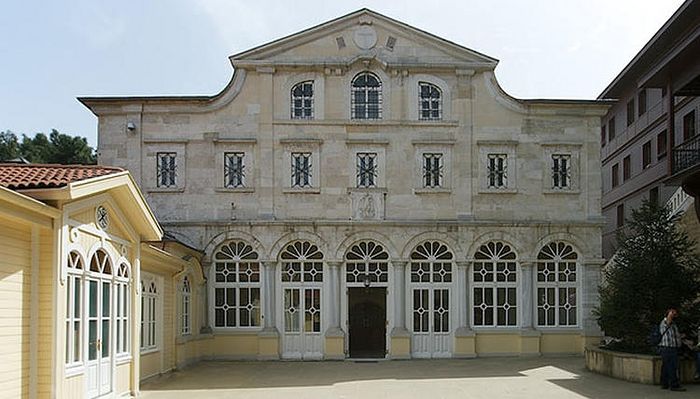
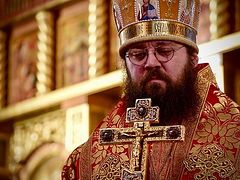
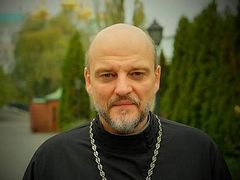
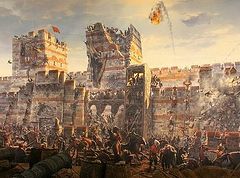
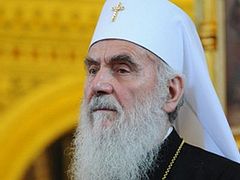
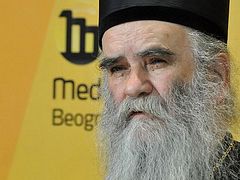
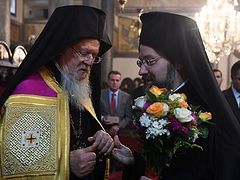
I appreciate you commenting. The Church though, and the whole creation is essentially hierarchical. (See St Dionysius "Ecclesiastical Hierarchy") You cannot simply abandon what is true and essential because there are temptations and falls present. People don't stop eating to overcome gluttony. We don't give up using money just because we tend to use it selfishly. The whole WAY of salvation is to struggle to regain what is true, not to abandon what is natural.